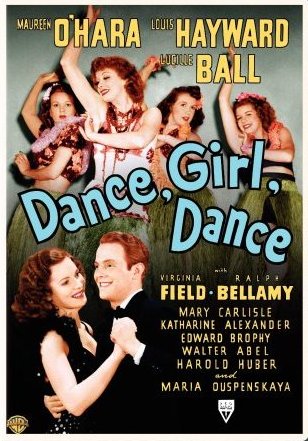
DANCE GIRL DANCE
US, 1940, 90 minutes, Black and white.
Maureen O’ Hara, Louis Hayward, Lucille Ball, Virginia Field, Ralph Bellamy, Maria Ouspenskaya, Walter Abel.
Directed by Dorothy Arzner.
Dance Girl Dance is a romantic melodrama echoing the styles of the late thirties. It was one of the earliest films made by Maureen O’ Hara, who bad come to Hollywood and made The Hunchback of Notre Dame with Charles Laughton. She was to have a very successful career during the forties and fifties and into the sixties. Lucille Ball does her usual turn as the wisecracking gold digger. She was in many films like this at the time. She was to move to better roles and then into television and even to buy the R.K.O. studios where this film was made. Ralph Bellamy and Louis Hayward perform roles typical of their work at the time. The film is of interest now as the work of Dorothy Arzner, the main woman director of commercial films in Hollywood of the thirties. Something of a feminist point of view comes across in the Maureen O’ Hara character’s speech attacking the men at the Burlesque. Enjoyable historical melodrama.
1. A satisfying romantic melodrama of the forties? Impact now? Presentation of America,. of the American dream?
2. Production values, black and white photography, locations and sets, music, choreography?
3. The work of Dorothy Arzner and her feminine outlook? The presentation of men, heroines? Men using women? The importance of Judy's speech in the theatre at the Burlesque and the reaction to it?
4. The dancing setting, the presentation of night clubs, gambling, police raids, the need for work, ballet, burlesque? A reflection of America in the thirties and forties?
5. How well did the film focus on the contrast between Judy and Bubbles? Their skills as dancers, careers, their attitudes towards men and romance? The hold that one had over the other? Winning and losing?
6. Judy as the pleasant American heroine - with a touch of the Irish? Her skills, dancing, her words at the beginning during the police raid, her trying for a Job, the audition for the hula? Her love for Jim? Her stubbornness? Her ambitions for skilful dancing, romance and Bubbles' intervention? her being used by Bubbles as a stooge and her decision to remain with this? The clash with the manager of the ballet and her not realizing who he was? The love for Jim, the humiliation of' the scene with his wife, her behaviour in the court case? The heroine with the happy ending?
7. The contrast with the portrait of Bubbles an the gold digger? Her dancing style, her attitude towards Jim? her doing of the hula and getting jobs and money, prestige? Tiger Lily White? Her hold over Judy and using her as a stooge? her jealousy? Marrying Jim and her offhand manner at losing him but gaining the money? How sarcastic a picture of the American gold digger?
8. Jim as the wealthy playboy, drunk, saving them during the raid, the picture of his marriage and its break-up, his attraction towards Judy, outings with Bubbles? His not telling Judy the truth, the clash in the restaurant? The irony of his marrying Bubbles? The court case and the resolution of his marriage?
9. The contrast with the manager of the Ballet, his pleasantness, tracking Judy in the rain and her rejection of him, his help at the Burlesque, at the court? The truth?
10. The portrait of dancers in the forties, the hard aspects of getting jobs? The characterisation of Madame and her coaching of the girls, getting them jobs, her hopes for Judy? The suddenness of her death in the street?
11. The world of night clubs, the ballet? The presentation of the choreography especially the traditional ballet with the modern style? The chorus dancing, the hula and what was required? Burlesque styles around 1940? The use of the stooge?
12. The court case as the focus for the resolution of the strands of the plot? How well were things sorted out, brought together?
13. The conventional material of romance and melodrama? The portrait of women at that time? The significance of Judy's speech and its contents, spoken at the Burlesque Theatre - a symbol for what was being explored in the characters of these two girls?